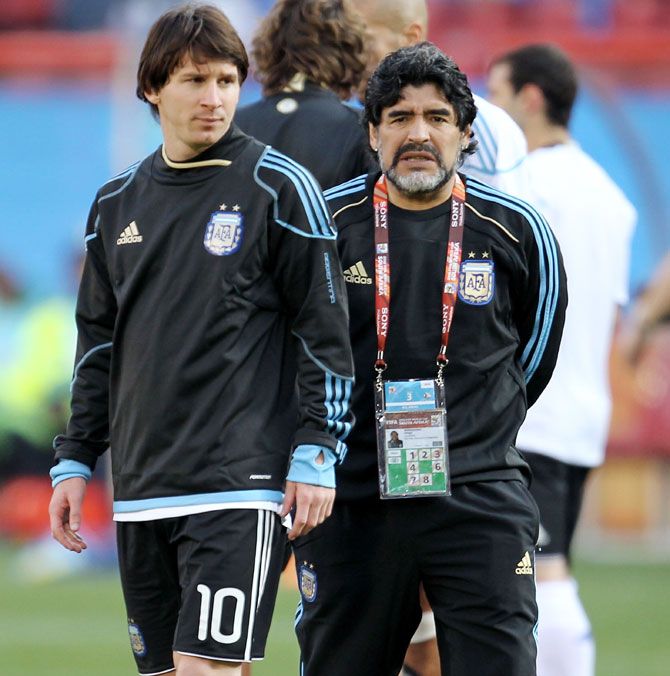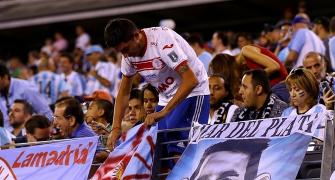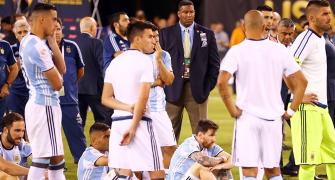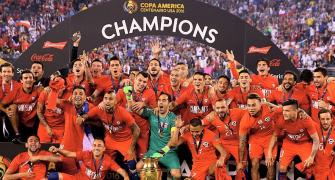
They were two small Argentina players with the same enormous challenge -- to meet the expectations of a soccer-mad country.
Diego Maradona and Lionel Messi have both proved themselves to be skilful giants on the world soccer stage despite their diminutive frames of 1.65 and 1.70 metres respectively.
But, while Maradona reached the heights by lifting the World Cup, Messi's only major international honour has been Olympic gold at the 2008 Beijing Games, even though at club level he has won four Champions Leagues with Spanish greats Barcelona.
Argetnina's failure to beat Chile in the final of the Copa America Centenario in the United States, a fourth lost final with the national team for Messi, proved too much for the little magician and he chose to quit international football on Sunday.
“The pressure (Messi) got from fans and media was and is very big. ‘Messi must continue with the Maradona legacy’ is the message,” sports medicine specialist Norberto Debbag said.
“The fans expect him to be leader and football star at the same time but it appears he’s not prepared for the social pressure the national team demands,” he told an Argentine website.
Maradona, who had so much natural skill that he would often juggle the ball during the team's warm-up with his bootlaces still undone, was always going to be a hard act to follow in an Argentina shirt.
He had to be pulled out of a cesspit he fell into as a two-year-old, fought tooth-and-nail for everything he achieved and, with his immense footballing talent, led Argentina to their second World Cup triumph in 1986 in Mexico.
It was rarely easy, though.
POOR RESULTS
Argentina arrived in Mexico after disappointing results in warm-up games and even the country's president was trying to get coach Carlos Bilardo replaced for fear of a poor tournament but a them-and-us attitude helped steer Maradona’s team through.
Argentina fans have always wanted Messi to replace him as the team's leader on such crusades, creating unbearable pressure with each failure to end a trophy drought dating back to 1993.
The street-wise urchin approach that served Maradona so well does not work for Messi.
Taking into account the Confederations Cup, Argentina have lost seven major finals since 1995, three of them to arch-rivals Brazil, and four since Messi's debut in 2005, including the 2014 World Cup final defeat by Germany.
The man closest to the force of personality brought to the team by Maradona and former defender Oscar Ruggeri, who captained Argentina to their 13th and 14th Copa America titles in 1991 and 1993, is Javier Mascherano.
But he has suffered even more than Messi with defeats in five finals from 2004.
Coach Gerardo Martino brought in former Argentine rugby union international Federico Todeschini in March to help his team with their motivation.
Argentina went on a run of eight straight wins, including a tournament group stage victory over Chile without an injured Messi. But for the final, they evidently needed something extra.
Harmony appeared to reign in the squad, Messi came back into the team after recovering and scored a record 55th goal for his country against the United States in the semi-final.
But he also had a troubled start to the build-up to the final, openly criticising the Argentine FA (AFA) over disrupted travel plans from Houston to East Rutherford in New Jersey.
He then decided to stay quiet over his team’s complaints about a lack of proper support from the AFA until after the final, telling reporters: “I’ll tell you afterwards.”
However, Argentina's defeat on penalties for the second time in a year to Chile has overtaken Messi's concerns for now.










